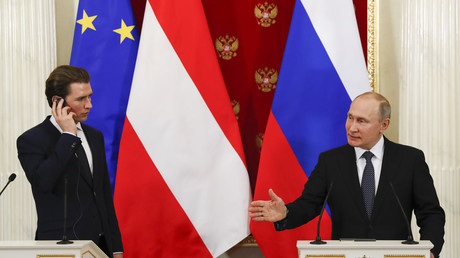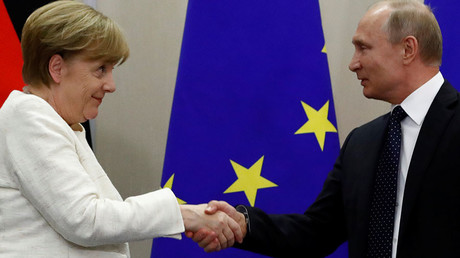Building bridges: Putin to visit Austria in first foreign trip after re-election

Russian President Vladimir Putin is set to visit Austria on Tuesday – a country that traditionally has good relations with Moscow. His trip, however, might have wider implications for a Europe that seems to be at a crossroads.
Austria has had constructive and pragmatic –if not friendly– relations with Russia and its predecessor, the Soviet Union, since the establishment of the Second Republic back in 1955. Vienna has also strived to keep it that way through the recent turbulent years, marked by increased tensions between Russia and Europe.
Even though it had to join anti-Russian sanctions after Russias reunification with Crimea and the start of the Ukraine crisis, Austria repeatedly called for easing or even lifting the restrictions, pointing at their ineffectiveness and utter futility.
Read more
Vienna has also reaffirmed its commitment to cooperation with Russia, particularly in the energy supply field, and prioritized the importance of keeping all channels open for dialog. Moscow also sets a high value on its good relations with the small Alpine nation. Austria was the first European country Putin visited in summer 2014, after the outbreak of the European conflict put a strain on Russias relations with the EU.
Now seems the right time to give these good relations a boost. Last month, the Austrian Chancellor Sebastian Kurz praised Russia as a “superpower” as he expressed Viennas desire to “keep the channels of communication with Russia open.”
In his interview with the Russian media ahead of Putins visit this week, he said he sees a “positive dynamic” in the development of bilateral relations, adding that they have “enormous potential.” Kurz also chose Russia as a destination for his first visit to a non-EU country after he took up the chancellors post in what could also be described as a positive sign.
His Austrian Peoples Partys coalition partners, the right-wing Freedom Party (FPO), hold an even more favorable view of Moscow. The FPO called for the lifting of anti-Russian sanctions on numerous occasions throughout these years and even vowed to fight for it as part of the Austrian government.
The FPO members also visited Crimea in 2017. Austria maintains strong economic ties with Russia, even though bilateral trade between the two nations has been severely hit by a series of sanctions and counter-sanctions imposed by Moscow and Brussels against one another over the course of the Ukraine crisis.
Read more
Economic ties seem to be recovering: In 2017, the trade turnover between Russia and Austria grew by 40 percent, compared with the previous year. Some 60 percent of Austrias gas supply also comes from Russia. Since the start of 2018, the Alpine nation has increased its gas imports by an impressive 77.2 per cent, compared to the same period of the already record-breaking previous year.
The Russian presidents visit also conveniently coincides with the 50th anniversary of the beginning of Soviet gas supplies to the Alpine nation. The Austrian OMV energy company became the first western enterprise to sign a gas supply agreement with the Soviet Union in 1968.
Against such a positive backdrop, Putins visit to Austria, his first foreign visit since re-election in March, is poised to be beneficial for both sides in terms of both political and economic relations. However, the two leaders might have some bigger plans in mind than just a bilateral agenda. Austria, which takes pride in its neutrality and geographical location “at the heart” of the European continent, apparently strives to fill a role as a bridge in relations between Moscow and the EU, which Kurz says he wants to normalize.
One has to admit that a small Alpine nation could hardly be called a political heavyweight in the current European political landscape. Neither is Austria likely to single-handedly undo the damage done to Russian-European relations by the years-long bickering over the conflict in Ukraine, the Syrian war and some other issues.
Still, it might be able to influence the situation at a time when the future of European foreign policy seems to be left in a sort of limbo. Kurz has already said that his government would seek to “bridge” the rift between Brussels and some opportunist Eastern European governments, which has been plaguing the bloc for quite some time.
Read more
The Austrian government, which once called itself pro-EU, also seemingly sided with such countries as Hungary on issues such as migration and Brussels excessive interference in the internal matters of EU member-states.
The self-proclaimed mediators are scheduled to take over the lead in the EU for six months, starting from July. In the meantime, Europe is still on the brink of a full-scale trade war with its major ally, the US, after President Donald Trump slapped his European partners with import tariffs on steel and aluminum.
Washingtons unilateral withdrawal from the 2015 Iran deal, which the European leaders are desperately seeking to keep afloat, does not make transatlantic relations any easier. The rift in relations between the EU and the US might well push the Europeans towards a closer cooperation with Russia.
Notably, Putin has already discussed potential defensive measures against the latest sanctions the US said it would impose on companies dealing with Iran, with none other than the European political heavyweight – German Chancellor Angela Merkel.
All these facts do not mean that we will suddenly see a rapid improvement in Russian-European relations or the lifting of anti-Russian sanctions just yet. Still, Austrias efforts could make some difference and push the matter a little bit further. Besides, a voice of reason and pragmatism amid the waves of anti-Russian hysteria would be a positive change of scenery.
[contf]
[contfnew]

RT
[contfnewc]
[contfnewc]





